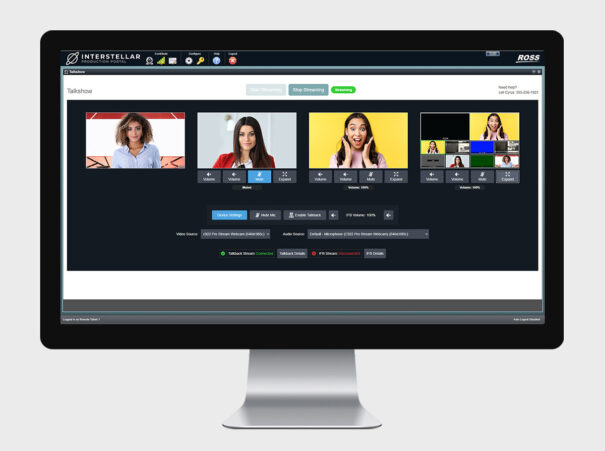Ross Video’s Interstellar remote production platform is available now
Ross Video has launched Interstellar, a remote production solution accessible and controllable through a web browser.
First announced earlier this year, and developed in the context of Covid-19, Interstellar is a remote production platform that enables content creators to combine their “traditional” working methods and on-site staff with remote talent and collaborators. Unlike other meeting and conferencing tools, Ross Video’s solution enables “high-quality production values” and combines a professional feature set with “extremely low” latency.
A key element of Interstellar is the Interstellar Streaming Gateway, a 1RU hardware solution that provides connectivity between SDI and WebRTC transports. Once configured, the Streaming Gateway is controlled through the Interstellar user interface. Compatible with 720i, 1080i and 1080p, the Streaming Gateway can receive and decode four WebRTC streams, sending them over SDI and receiving and distributing an incoming SDI stream to all four partners. The hardware can handle up to sixteen audio channels per stream and supports OPUS and H.264 codecs.
Three versions of Interstellar
Interstellar is currently available in three editions, based on the number of remote studios, concurrent users and SDI inputs: Interstellar Express (one remote studio, five concurrent users, four streams), Interstellar Prime (two remote studios, ten concurrent users, eight streams) and Interstellar Standard (five remote studios, 25 concurrent users, 32 streams). Today, one streaming gateway is required for each remote studio.
Amanda Holstrom, product manager for Interstellar, confirms that Ross Video will offer the solution “via a subscription model” and elaborates on the convenience of remote tools today: “We’ve all seen how important remote collaboration and production has become over the last eighteen months. I’m very proud of the work our team has done in creating a solution for the live production industry that delivers what’s needed – low-latency, ease of use and rich functionality.”
¿Te gustó este artículo?
Suscríbete a nuestro RSS feed y no te perderás nada.
















